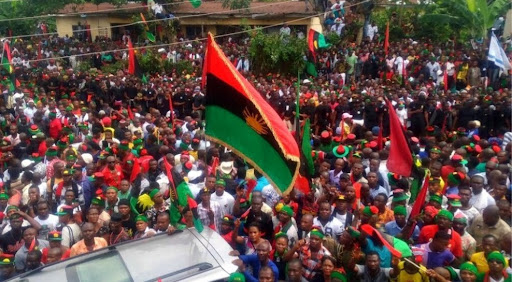
For months now, the Indigenous People of Biafra (IPOB), led by Nnamdi Kanu, and Yoruba Nation agitators, led by Sunday (Igboho) Adeyemo, have been calling for a break-up of the Nigerian state.
While IPOB members are demanding that a separate country, Biafra nation, should be carved out of Nigeria, the Yoruba nation agitators want Oduduwa Republic.
The agitations gained public attention following insecurity in many parts of Southern Nigeria, which eventually led to the ban on open grazing.
Before then, there were reports on deaths of different individuals, loss of property worth millions of naira, and food shortages due to neglect of farmlands and destruction of crops.
The conflict between herders and farmers in Southern Nigeria also strengthened the debates around ‘true federalism’ and restructuring which, among other things, will allow state governors to have control over state police. It further led to the formation of regional security networks, such as Amotekun corps in the Southwest and Ebube Agu in the Southeast, to check other forms of crime.
HumAngle has also done extensive reports on how terror groups cause sleeplessness to residents in the Northern part of the country.
As part of efforts to achieve the break-up, Yoruba nation agitators have threatened to disrupt the 2023 election in the region and IPOB members are already preaching against the upcoming Anambra State election.
Amidst these, some public and socio-political analysts believe that devolution of powers from the central government would tackle the major challenges faced by the country.
“The concept of the federal government holding resources and distributing to the regions is no longer acceptable and that is why we support the governors who want devolution of powers,’’ a lawyer, Ebun-Olu Adegboruwa (SAN) said in June.
Will devolution of power really work?
Some scholars have argued that devolution of power brings government closer to the people, and with that, local authorities can work more effectively to improve public services for their communities.
HumAngle’s findings showed that some countries have successfully delegated some central government powers to subsidiary governments and it is working for them.
In fact, they created a de-facto federation and regionalised unitary structures, which have been useful. These countries include New Zealand, Spain, the United Kingdom, and Italy.
Since its independence journey started, Nigeria has witnessed at least nine attempts by authorities to make a devolution themed constitution.
An analyst, Jide Omoboriowo, told HumAngle that “with devolution of power, there will be less pressure on the federal government. I believe that if Nigerians have the opportunity to live a good life, no one will call for separation.”
“Security of the country is key to devolution discourse and I think governors have made good efforts with the creation of regional security networks. Let’s see how well they will perform in the next couple of years.”
The PDP vice-presidential candidate in 2019, Peter Obi, believes in devolution or restructuring. For him, such an attempt will “boost the nation’s economy and end insecurity.”
The APC committee set up in Aug. 2017, however, recommended state police, power devolution, independent candidates during elections, referendums on national issues, among others.
The committee reportedly engaged 8,014 people across the country to come up with its recommendations.
The areas the committee recommended some form of restructuring included: the merger of states, derivation principle, devolution of power, fiscal federalism, independent candidacy, judiciary, local government autonomy, revenue allocation, citizenship, referendum, public holidays and state police.
Meanwhile, IPOB leader Kanu, in May kicked against restructuring and devolution of power. He said “what Nigeria needs is dismemberment, not some dodgy restructuring.”
Also, Adeyemo in Oct. 2020 rejected the proposal of Nigeria’s restructuring and devolution of power, insisting on his firm support for Oduduwa nation.
As the level of insecurity in Nigeria continues to deteriorate, it is not clear whether devolution will solve its hydra-headed challenges. All that matters to average Nigerians is most likely that they are able to live and sleep with their two eyes closed at night. But the question remains — how best can that be achieved?
Support Our Journalism
There are millions of ordinary people affected by conflict in Africa whose stories are missing in the mainstream media. HumAngle is determined to tell those challenging and under-reported stories, hoping that the people impacted by these conflicts will find the safety and security they deserve.
To ensure that we continue to provide public service coverage, we have a small favour to ask you. We want you to be part of our journalistic endeavour by contributing a token to us.
Your donation will further promote a robust, free, and independent media.
Donate HereStay Closer To The Stories That Matter




